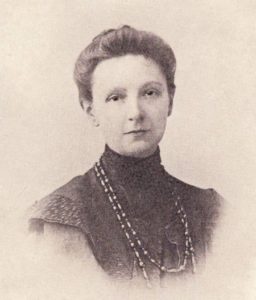
Today we continue our regular series called “Learning from the Saints.” Our guide is expert Bert Ghezzi, a dear friend of mine and the author of numerous books including Voices of the Saints, Saints at Heart, and Discover Christ: Developing a Personal Relationship with Jesus.
His more recent books are The Power of Daily Mass and The Heart of Catholicism. You can learn more about Bert and his work at BertGhezzi.com.
Today, Bert profiles Servant of God Elisabeth Leseur, the patron of cancer sufferers and incurable diseases.
After Elizabeth Leseur’s death, Felix, her husband, found her notebooks that revealed a passionate spiritual life that she had concealed beneath her genteel, pleasant demeanor. Her simple application of Christian truths to her soul touched him deeply, as did his discovery that she had quietly offered years of great suffering for his conversion. Felix was so moved that he not only embraced Christ but also became a Dominican priest, who traveled throughout Europe speaking about his wife’s spiritual writings.
 Felix, a doctor, had abandoned his faith when he read the fashionable atheistic literature of the late 19th century. Ironically, his attempt in 1899 to get Elizabeth to read Renan’s Life of Jesus occasioned her spiritual awakening. From that time she kept a journal in which she recorded her progress in making her life a purer and better instrument for serving God and others. God seems to have invaded her soul, giving her a profound awareness of the interdependence of Christians. Isolated from Christian conversation in her marriage, Elizabeth participated by prayer in the communion of saints. And in her social contacts she made it her preference to show kindness particularly to the irksome people who bored her. “I want to have boundless charity,” she wrote, “especially toward those who do not attract me.”
Felix, a doctor, had abandoned his faith when he read the fashionable atheistic literature of the late 19th century. Ironically, his attempt in 1899 to get Elizabeth to read Renan’s Life of Jesus occasioned her spiritual awakening. From that time she kept a journal in which she recorded her progress in making her life a purer and better instrument for serving God and others. God seems to have invaded her soul, giving her a profound awareness of the interdependence of Christians. Isolated from Christian conversation in her marriage, Elizabeth participated by prayer in the communion of saints. And in her social contacts she made it her preference to show kindness particularly to the irksome people who bored her. “I want to have boundless charity,” she wrote, “especially toward those who do not attract me.”
Sick all her life with hepatitis, Elizabeth’s condition worsened after 1908. And in 1911 she was diagnosed with cancer. She calmly accepted the disease’s intense pain, and understood it as a form of prayer. She explained her view in this letter to a woman who was facing blindness:
“I know all that suffering means, the fine and mysterious power it possesses, what it obtains and what it accomplishes. After all, our activity is of little importance. When Providence prefers to work by means of suffering, we should not complain too much. Then we can be sure that the work will be well done and not mixed up with all the misery of egotism and pride which sometimes spoil so much of our outward activity. I know by experience that in hours of trial certain graces are obtained for others which all our efforts had not previously obtained. I have thus concluded that suffering is the higher form of action, the best expression in the wonderful communion of saints. In suffering one is sure not to make mistakes, sure to be useful to others and to the great causes one longs to serve.
“The Stoics said, ‘Suffering is nothing.’ They were wrong. Illuminated by a clearer light we Christians say, ‘ Suffering is everything!’ It demands, it obtains, everything. Through it God consents to accomplish everything. Suffering helps Christ to save the world and souls. When I am overwhelmed by the immensity of my desires for those I love, … it is toward suffering that I turn. It is through suffering that I ask to be allowed to serve as an intermediary between God and souls. It is the perfect form of prayer, the only infallible form of action….Through the cross to the Light.”
After enduring a long agony, Elizabeth Leseur died in 1914 at the age of 48. The cause for her beatification was started in 1934. Her current status in the process is that of a Servant of God.
“I believe that their circulates among souls—those here below, those expiating their sins, and those who have obtained true life—a vast and ceaseless stream of the sufferings, merits and love of all these souls. And that through the divine action even our slightest pains, our least sorrows, can reach out to souls both dear and distant and bring them light and peace and holiness.” — Elizabeth Leseur
Read more from Bert at his website www.BertGhezzi.com, or check out his many books on Amazon.
